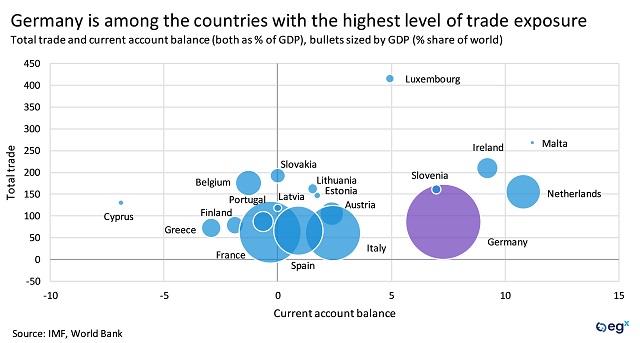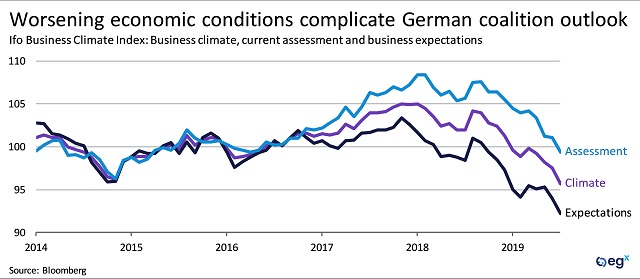Original post:
Last week S&P downgraded a handful of banks while the OECD told all and sundry that Germany was already in recession:
The OECD trimmed its forecast for the shared currency block, largely due to the slowdown in its biggest economy, Germany, which was estimated to be in a technical recession.
Euro zone growth was seen at 1.0% - down from 1.2% in May - this year and 1.0% in 2020 - down from 1.4% in May.
Boone said Germany’s economy had probably shrunk in the second and third quarters with a slump in car manufacturing, which accounts for 4.7% of German GDP, knocking three-fourths of a percentage point off German growth.Meanwhile the DAX seems pretty nonchalant:
—CNBC, Sept. 19
And with the elections behind us some of the worst fears of the chatteratti have not come to pass.
From Eurasia Group, August 30:
Politics in Pictures: a visual guide to Germany
Specter of recession haunting German politics
Earlier this month the Federal Statistical Office of Germany announced that June industrial production decelerated by 5.2% year over year, the largest annual decline in almost a decade. The Economy Ministry attributed the lackluster reading to weakness in the metal, machinery, and auto production industries, driven by the ongoing global slowdown and escalating trade tensions.

A German recession now looks probable. The economy shrank by -0.1% in the second quarter of this year. Since then the critical manufacturing sector (which makes up 27% of GDP) continues to weaken and business confidence is plummeting (see below). Recognizing these headwinds, even Germany's central bank, the Bundesbank, warned on 19 August that the economy would likely shrink again in the third quarter.
The timing could not be worse for German politics. The slowing economy comes as the sun is setting on the long reign of Chancellor Angela Merkel, whose influence over domestic and broader EU politics is declining even though she intends to stay in office until 2021. Divisions are becoming apparent within the ruling “grand coalition” of the sister Christian Democratic Union and Christian Social Union (CDU/CSU) and the Social Democratic Party (SPD). Populist sentiment is rising, lending support to the far-right Alternative for Germany (AfD) party. As a result of these pressures Eurasia Group thinks the grand coalition will likely break up entirely by the end of the year.

...MORE
Updates, Monday September 23:
"Simply Awful": German PMI Plunges To 7-Year Low As Manufacturing Recession Accelerates, Spreads To Services
Capital Markets: "Dreadful European Flash PMI Drags the Euro Lower"